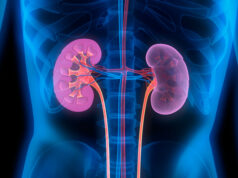UniQure is making a case for lifting a clinical hold on its hemophilia B gene therapy, reporting Monday results of an independent investigation that appear to clear the experimental treatment as the cause of a patient’s cancer.
Last December, the FDA placed the clinical hold on the gene therapy, etranacogene dezaparvovec, after a patient who received the treatment two years earlier was diagnosed with a form of liver cancer. Cancer is a known risk of gene therapy, which uses an engineered virus to deliver its genetic payload into cells. Preclinical research has shown instances where gene therapies that use adeno-associated virus (AAV) integrated into mice DNA, causing liver cancer. UniQure’s gene therapy is delivered via AAV.
A lesion was detected on the liver of a patient in the uniQure clinical study, HOPE-B, during a routine abdominal ultrasound included in assessments of clinical trial participants one year after receiving the treatment. A sample of the tumor and adjacent liver tissue were removed to determine whether the gene therapy caused the cancer.
Amsterdam-based UniQure said an independent laboratory conducted multiple analyses that were reviewed by external experts in the field. Integration of the AAV vector into the patient tissue was “extremely rare” and accounted for 0.027% of cells in the sample, uniQure said. The instances where AAV integrated into the patient’s cells were distributed randomly across the genome, and there is no evidence that any cancer cells arose or that any integration event was dominant.
In addition, uniQure said that whole genome sequencing of the patient’s tumor confirmed that this patient had genetic mutations that are characteristic of liver cancer. Further analysis of the tumor and adjacent tissue found risks factors that predisposed the patient to liver cancer, uniQure said. The independent investigation found that it is “highly unlikely” the cancer was caused by the gene therapy. David Lillicrap, professor in the department of pathology and molecular medicine at Queen’s University in Kingston, Canada, said in a prepared statement that there is “no evidence to suggest that the AAV vector delivered in the HOPE-B study has played a pathogenic role in the hepatocellular cancer that has now been diagnosed in the patient.”
Hemophilia B is caused by a mutation to the gene that codes for a clotting protein called factor IX (FIX). Patients who have the inherited disorder can experience prolonged bleeding episodes. Standard of care treatment includes infusions of FIX protein. UniQure’s etranacogene dezaparvovec delivers a functioning version of the FIX gene to a patient’s cells. The gene therapy is intended to be a one-time treatment.
Last June, CSL Behring paid uniQure $450 million up front to acquire rights to the hemophilia B gene therapy and add it to its portfolio of blood disorder products. UniQure is still responsible for completing the Phase 3 study and submitting the therapy to the FDA for approval. But if the gene therapy reaches the market, uniQure could earn up to $1.6 billion in milestone payments.
UniQure said all patients in the gene therapy program have had abdominal ultrasounds and each will be monitored by clinicians. No other cases of liver cancer have been reported in the study. Ricardo Dolmetsh, president of research and development at uniQure, said in a prepared statement that the data have been shared with the FDA and the company expects to discuss the status of the clinical hold in the second quarter of this year. He added that uniQure expects to submit the data for presentation at a yet-to-be-determined industry conference.
Photo: virusowy, Getty Images







